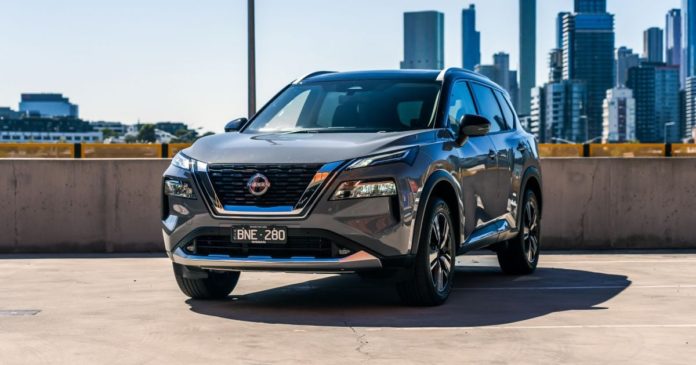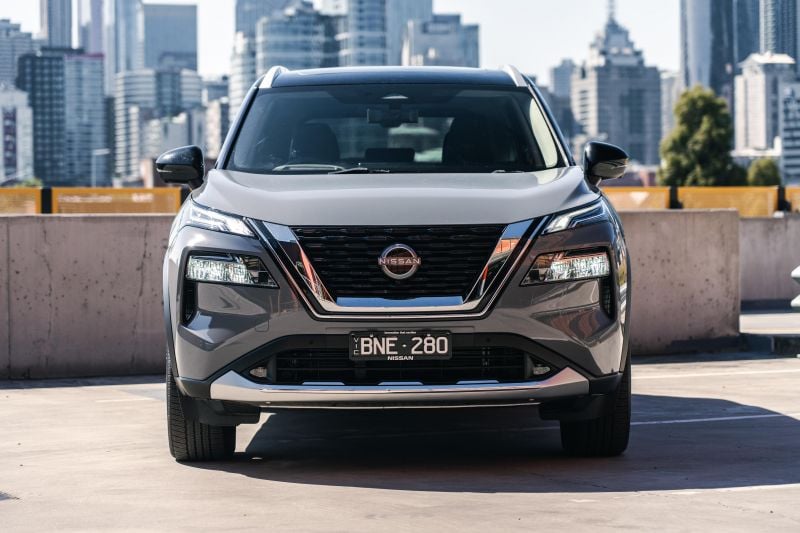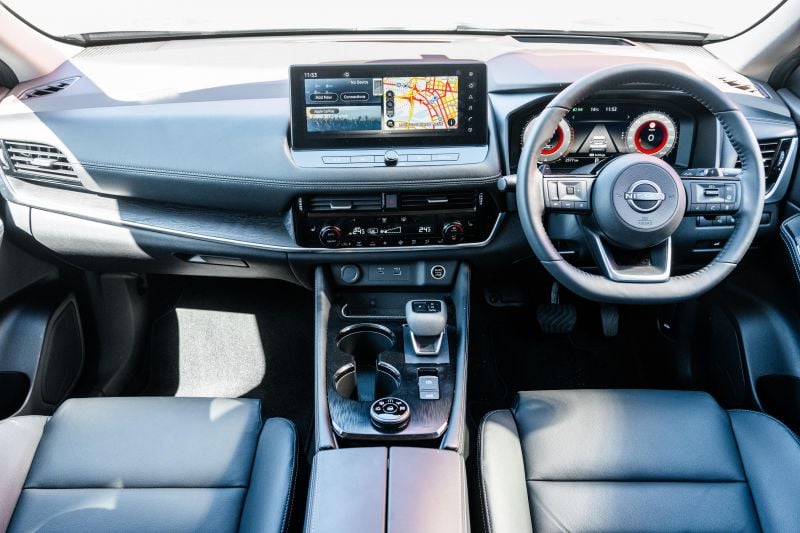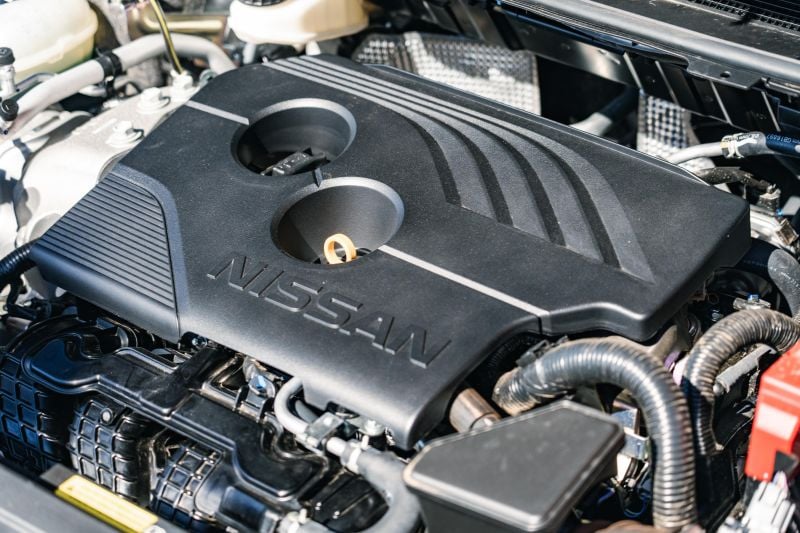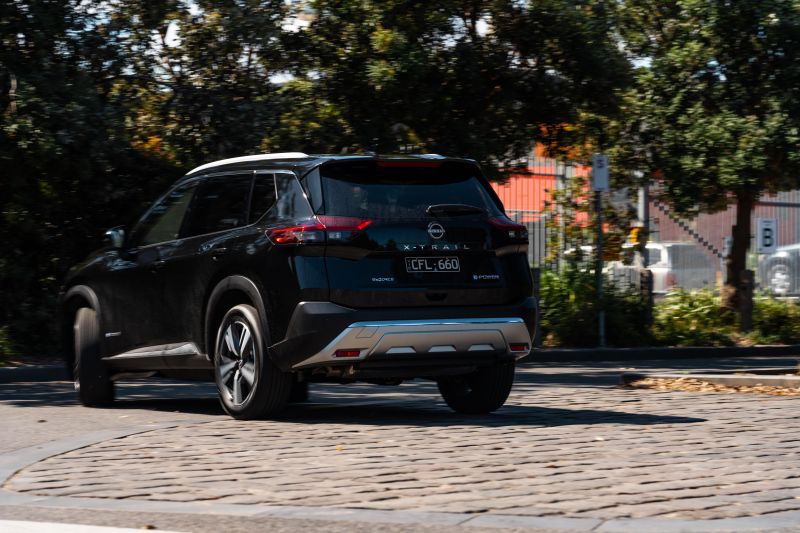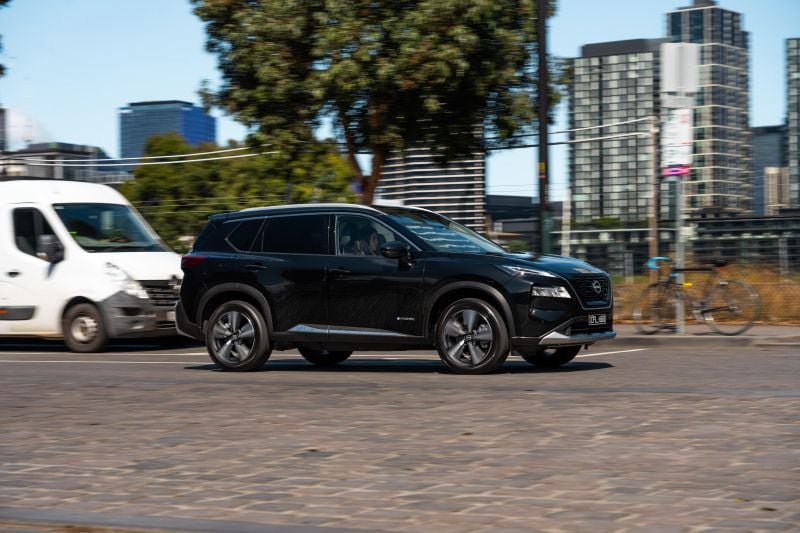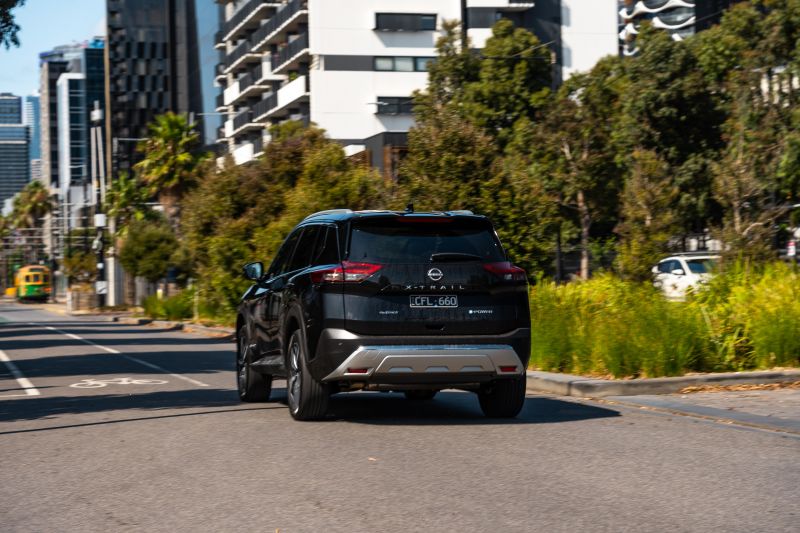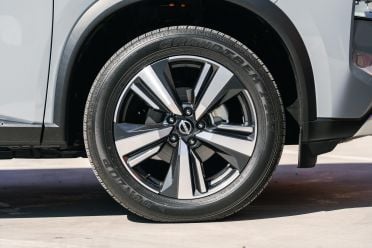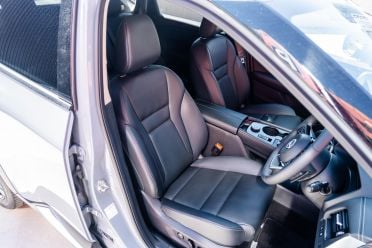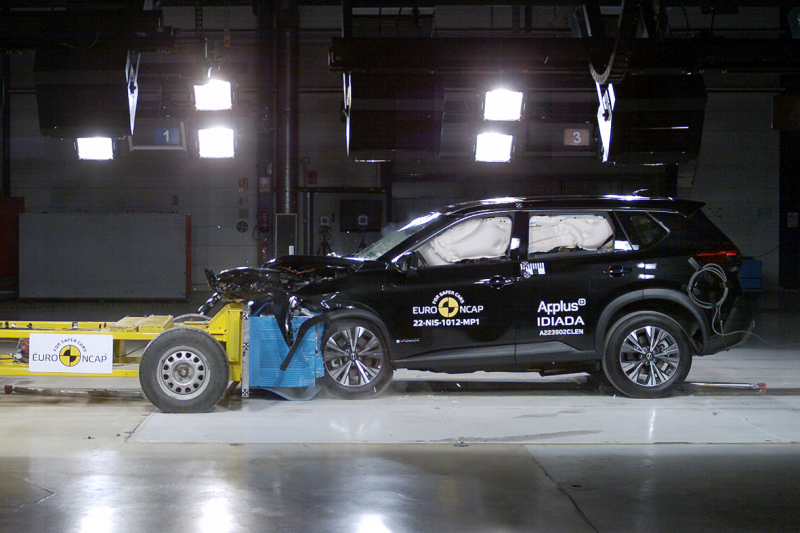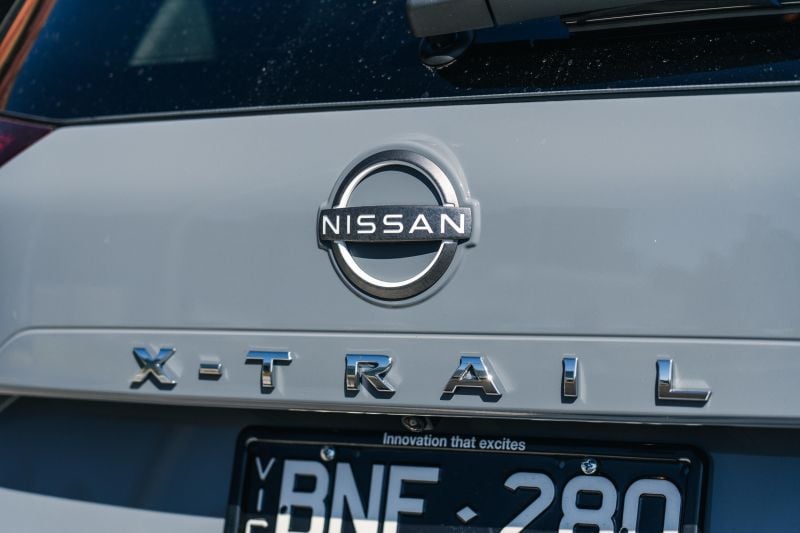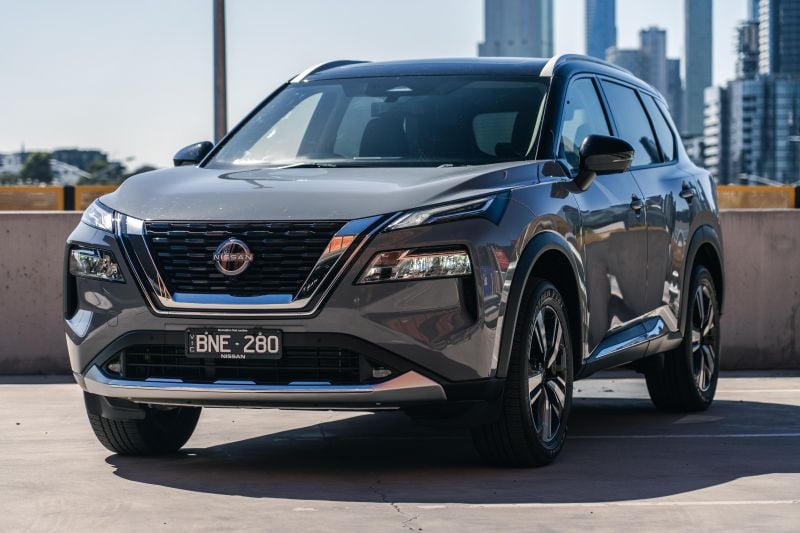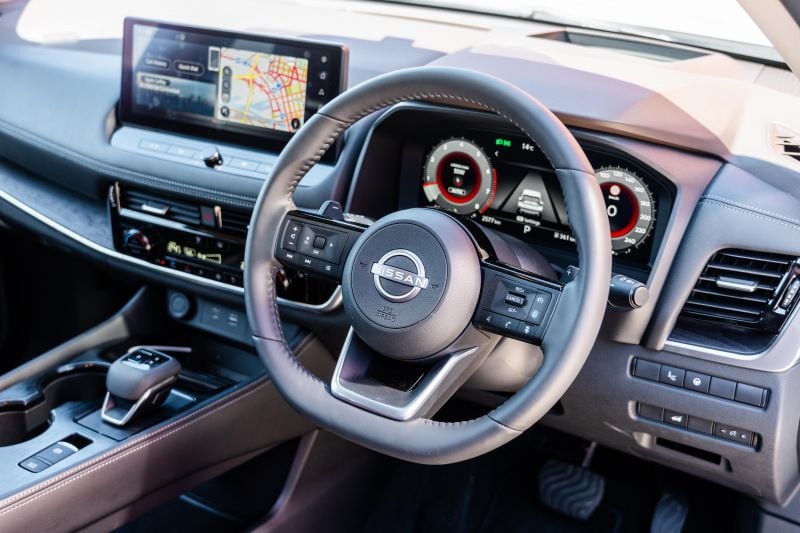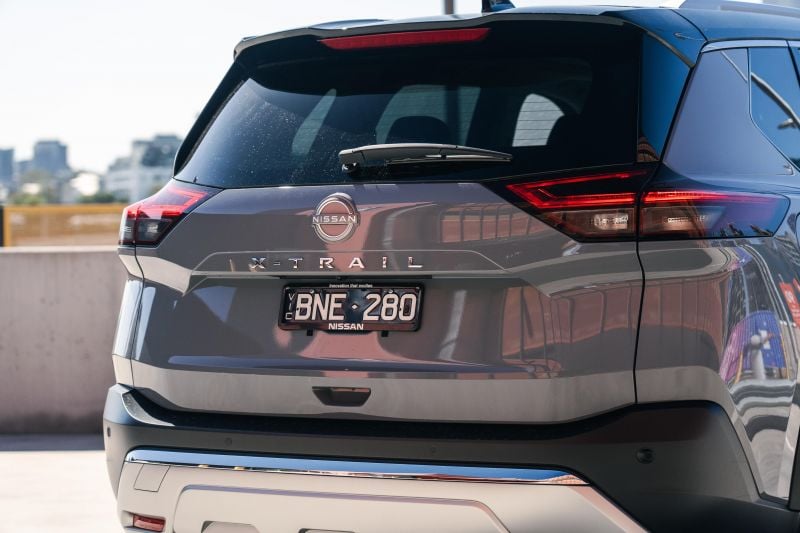The Nissan X-Trail is one of the most recognisable names in the smaller SUV segments.
Since the original debuted in 2000, the X-Trail has been duking it out with the Honda CR-V and Toyota RAV4 almost since the dawn of time – as far as this crop of competitors are concerned.
Two decades on and it’s still one of the most popular vehicles in its class, and remains a critical nameplate for Nissan. Australia is among the top markets in the world for the X-Trail, which is saying something given the vehicle’s enduring popularity in major markets like North America.
Nissan Australia recently introduced an e-Power series hybrid option to electrify the X-Trail for the first time in Australia, and capitalise on surging sales of electrified vehicles including the top-selling RAV4 Hybrid. But, that’s not the vehicle we’re looking at here.
The 2024 Nissan X-Trail Ti 4WD is the penultimate petrol variant on the grade walk, and priced from a smidgen over $50,000 before on-road costs it’s pretty good value compared to petrol-powered rivals.
But as the segment continues to shift, and rivals with newer, turbocharged and more efficient drivetrains launch, is a high-spec X-Trail with exclusively petrol power worth your consideration?
Well, read on to find out…
How does the Nissan X-Trail compare?
View a detailed breakdown of the Nissan X-Trail against similarly sized vehicles.

Nissan
X-Trail
How much does the Nissan X-Trail cost?
The 2024 Nissan X-Trail Ti 4WD is priced from $50,490 plus on-road costs.
Nissan X-Trail pricing:
- 2024 Nissan X-Trail ST
- 2WD 5 seat: $37,250
- AWD 7 seat: $40,290
- 2024 Nissan X-Trail ST-L
- 2WD 5 seat: $43,690
- 4WD 7 seat: $46,790
- e-Power with e-4orce 5 seat: $49,990
- 2024 Nissan X-Trail N-Trek
- 2WD 5 seat: $47,290
- 4WD 7 seat: $50,390
- 2024 Nissan X-Trail Ti
- 4WD 5 seat: $50,490
- e-Power with e-4orce 5 seat: $54,690
- 2024 Nissan X-Trail Ti-L
- 4WD 5 seat: $53,490
- e-Power with e-4orce 5 seat: $57,690
Prices exclude on-road costs
To see how the X-Trail lines up against its rivals check out our comparison tool.
What is the Nissan X-Trail like on the inside?
The latest X-Trail has been a welcome and significant jump in cabin ambience and technology.
Ti and Ti-L grades get a very digitised cabin, incorporating dual 12.3-inch displays and a colour head-up display with 10.8 inches of real estate.
Seat comfort is great up front, with supportive driver and passenger chairs that benefit from 10-way power adjustment with lumbar. If you want memory settings, you’ll need to shell out for the Ti-L and its Nappa leather trim. Presentation is up there with the best in class, thanks to high perceived build quality and a high ratio of softer surfaces.
Nissan also offers two interior colours in both the Ti and Ti-L. Here we have the standard black leather trim but you can also option a Light Grey colourway at no extra cost. It’s really nice to see choice offered in this segment.
Nissan’s new 12.3-inch digital instrument cluster is an improvement over the dated binnacles of its old stuff, and while it’s attractive and offers a few menus and layouts – including a cool drivetrain display – it lacks the crispness of stuff from the VW Group, and will only display mapping when using turn-by-turn navigation.
It’s a similar story to the 12.3-inch central touchscreen, which presents nicely on first glance and offers a good suite of features, but lacks internet connectivity. Wireless Apple CarPlay is a great inclusion though, and it worked flawlessly during our time with the X-Trail.
The native interface occasionally lags, but it’s otherwise fine for the class and definitely is a substantial upgrade for someone coming out of a previous X-Trail or Qashqai.
Storage and amenities are pretty good up front, with a deep rubberised wireless charging pad; USB-A, USB-C and 12V outlets; large toothed cupholders, and a deep centre console bin underneath a padded leatherette armrest. The centre tunnel also has a floating design, with a rubberised section underneath to store larger items which is handy, and something fairly unique for the segment.
You’ve also got a shift-by-wire gear selector which looks swish and is user-friendly. You also have a rotary dial to shuffle through drive and terrain modes. It’s good Nissan has stuck with physical switchgear for the climate controls, which are all clearly labelled and within easy reach.
Altogether, it feels that little bit more upmarket than the related Mitsubishi Outlander, even though the two vehicles share many parts and components.
Arguably one of the X-Trail’s biggest selling points is rear passenger room and boot space. There’s plenty room for full-grown adults in the back, even behind taller drivers. I didn’t find the panoramic sunroof to be an issue for headroom either behind my own driving position, and I’m 6’1.
Rear air vents with a third zone of climate control are standard on the Ti, along with additional USB-A and USB-C charge ports for keeping smartphones and tablets juiced. The centre seat folds down to make a centre armrest with cupholders, and the requisite ISOFIX anchors and top-tether points are all fitted as standard.
Nissan quotes 585 litres of capacity (to the roof) in five-seat X-Trail models. Unfortunately the Ti and Ti-L are not available with a third row of seating, though there is a space saver spare wheel under the boot floor.
What’s under the bonnet?
The X-Trail Ti is available with two powertrains in Australia – we have the standard petrol option on test here.
| Model | Nissan X-Trail 2.5 4WD |
|---|---|
| Engine | 2.5-litre 4-cyl petrol |
| Power | 135kW (6000rpm) |
| Torque | 244Nm (3600rpm) |
| Transmission | CVT auto |
| Driven wheels | All-wheel drive |
| Weight | 1668kg (tare) |
| Fuel economy (claim) | 7.8L/100km |
| Fuel economy (as tested) | 10.8L/100km |
| Emissions (CO2) | 183g/km |
| Fuel tank size | 55L |
| Fuel requirement | 91 RON |
To see how the X-Trail lines up against its rivals check out our comparison tool.
How does the Nissan X-Trail drive?
While the X-Trail looks and feels pretty upmarket, the drivetrain by comparison isn’t quite up to scratch.
-
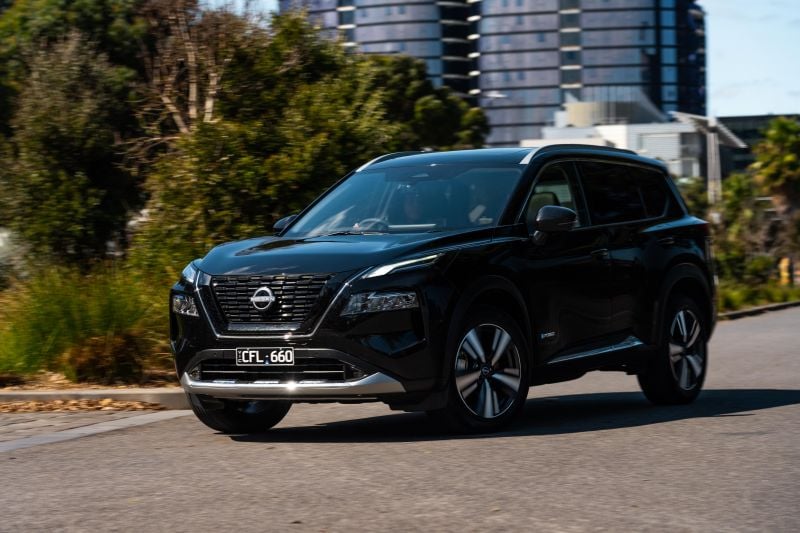
Ti e-Power shown
The 2.5-litre petrol engine is essentially a carryover of the previous generation’s powerplant, and it was barely adequate before – now in 2024, it’s lagging behind the pack.
Yes there are plenty of rivals that offer naturally aspirated petrol engines at the base level, but they’re usually not the picks of the range either. Plus, Nissan’s dual-motor e-Power hybrid drivetrain is just so much better (at $4500 more).
Equipped with a CVT automatic, the X-Trail often surges off the line and can feel a bit elastic in its power delivery. A proper transmission would likely help with that, but then it would also expose the engine’s lack of low-down torque.
Like the Mitsubishi Outlander, it does its best to simulate shifts when you demand a little more of it, and if you drive it sedately it’s… fine. I think the torquier 118kW/300Nm 1.5-litre three-cylinder turbo offered in other markets would be a much better and more modern inclusion, and deal better with a full family’s worth of kit in the cabin.
In normal commuting conditions like stop-start traffic and running about the suburbs, the X-Trail’s atmo motor offers enough response to not leaving you wanting much more.
Compared to the previous generation, the new X-Trail is definitely a marked improvement in terms of overall comfort and refinement. Insulation from powertrain, road and wind noise is very good for the class, and the overall ride comfort and body control is very good as well.
Where the old car could wallow about and even porpoise over undulations, the new one balances ride compliance and secure road holding quite well. It irons out the lumps and bumps of city roads quite well, while also keeping the body relatively tight when the roads get windy.
The steering is pretty light and doesn’t offer the greatest amount of feedback, but it’s accurate enough and makes manoeuvring this 4680mm long and 1725mm wide family SUV quite easy. It feels a little more dialled in than the related Mitsubishi Outlander, but lacks the directness of the Mazda CX-5 or Volkswagen Tiguan.
It’s worth noting that fuel use starts to blow out in stop-start city traffic because the atmo X-Trail lacks idle stop-start technology. We saw an indicated 10.8L/100km over our week of testing which included the daily commute to and from the office with a mix of suburban, city and freeway driving.
Speaking of the freeway, the X-Trail’s CVT helps the petrol engine settle at a cruise, but getting up to triple figures isn’t this drivetrain’s favourite activity.
The engine and transmission combo will be keen to rev out to get you to highway speeds quicker, which can induce a bit more engine noise and the CVT’s attempts at simulating ‘steps’ is admirable. But, having tried the e-Power on numerous occasions, the added performance and refinement of the hybrid version is hard to ignore.
It’s otherwise pretty pleasant once you reach a cruise, with a comfortable and settled ride, good insulation from the outside world, and a big-car feel to the road holding that inspires confidence. The Ti is also decked out with a fulsome suite of assists to keep you on the straight and narrow.
Nissan’s ProPilot system combines the adaptive cruise control with an active lane centring assist to facilitate Level 2 semi-autonomous driving on the motorway. It’s a capable assistant if not quite the benchmark even within this segment.
It can be sensitive to vehicles you’re approaching or enter the lane ahead of you, meaning it can teeter 1-3km/h below the set speed which is annoying. It otherwise does a decent job of keeping you a safe distance from a leading vehicle.
The lane centring is a similar story, usually doing a good job but can be a little afraid of sharper bends or when it senses road dividers or walls. In these scenarios it can sometimes hug one side of the lane or even cross the lines.
Other handy assistants include blind-spot and rear cross-traffic assists, which actively steer or brake you out of trouble, as well as auto high-beam. The surround cameras with Moving Object Detection aren’t the last word on clarity but are handy to have given the X-Trail’s high sides and larger dimensions.
What do you get?
The Ti is the penultimate X-Trail trim level under the Ti-L – here’s a run down of the core lineup.
Nissan X-Trail ST
- 5 seats
- Auto LED head-and tail-lights
- Steering wheel paddle shifters
- 17-inch alloy wheels
- Auto-folding, heated mirrors
- Roof rails
- Reversing camera
- Rear parking sensors
- 8.0-inch touchscreen
- DAB+ radio
- 6 speakers
- 4 x USB points (1 x USB-A, 1 x USB-C front, rear)
- Apple CarPlay, Android Auto
- 7.0-inch TFT cluster display
- Fabric seats
- Space-saver spare wheel
- AWD and 7 seats optional
Nissan X-Trail ST-L adds
- 5 seats
- Privacy glass
- 18-inch alloy wheels
- Front parking sensors
- Surround-view camera
- Dual-zone climate control
- Synthetic leather-accented seats
- Heated front seats
- Power driver’s seat
- Fog lights
- Leather-wrapped steering wheel
- Auto-dimming rear mirror
- Sliding rear seats, 40:20:40 folding
- ‘Divide-N-Hide’ cargo area system
- ProPILOT with Lane keep assist
- e-Power with e-4orce optional
- AWD and 7 seats optional
X-Trail N-Trek adds:
- Dark exterior accents
- Grille surrounds
- Lower front bumper
- Side mirrors
- Door handles
- Roof rails
- Unique 18-inch alloy wheels
- LED fog lights
- 10.8-inch head-up display
- 12.3-inch digital instrument cluster
- 12.3-inch touchscreen infotainment system
- Satellite navigation
- Wireless phone charger
- Wireless Apple CarPlay
- Waterproof leatherette upholstery
Nissan X-Trail Ti adds
- AWD and 5 seats
- 19-inch alloy wheels
- Panoramic sunroof
- Power tailgate
- Adaptive Matrix LED headlights
- Digital rear-view mirror
- Rain-sensing wipers
- Tri-zone climate control
- Genuine leather-accented seats
- 10-way power front passenger seat incl. power lumbar
- Ambient lighting (console only)
- e-Power with e-4orce optional
- 2-tone black painted roof optional
Nissan X-Trail Ti-L adds
- Hands-free power tailgate
- Reverse-tilt power mirrors with memory
- Remote engine start
- Heated steering wheel
- Quilted Nappa leather upholstery
- Driver’s memory seat presets
- Heated second row outboard seats
- Rear door sunshades
- Ambient interior lighting (doors)
- Side mirrors with tilt-to-reverse
- Bose 10-speaker sound system
- e-Power with e-4orce optional
- 2-tone black painted roof optional
Is the Nissan X-Trail safe?
The new X-Trail scores a five-star ANCAP safety rating – based on crash testing of the related Nissan Qashqai in 2021 – this now includes e-Power versions as well.
The X-Trail scored 91 per cent for adult occupant protection, 90 per cent for child occupant protection, 74 per cent for vulnerable road user, and an excellent 97 per cent for safety assist.
Standard features on all grades:
- 7 airbags incl. front-centre airbag
- 3 x top tether points, 2 x ISOFIX points
- Adaptive cruise control
- Automatic high-beam
- Autonomous emergency braking (AEB)
- Pedestrian, Cyclist detection
- Junction assist
- Reverse AEB with Pedestrian detection
- Blind-spot assist
- Lane departure warning
- Lane keep assist
- Rear cross-traffic alert
- Rear parking sensors
- Reversing camera
- Traffic sign recognition
- Trailer sway control in ESP
X-Trail ST-L adds:
- 360-degree cameras incl. Moving Object Detection
- ProPILOT (lane centring)
X-Trail Ti adds:
- Adaptive LED headlights
- Digital rear-view mirror
How much does the Nissan X-Trail cost to run?
As with the wider Nissan range, the X-Trail is covered by a five-year, unlimited-kilometre warranty.
Nissan also throws in five years of roadside assistance with purchase. Scheduled maintenance for all X-Trail models, meanwhile, is a disappointingly short 12 months or 10,000 kilometres – whichever comes first.
As for scheduled maintenance, Nissan Australia offers pre-paid service packages spanning two years to five years. The three-year plan is advertised for $1219 and the five-year plan is $2092. It’s the most expensive X-Trail to service.
CarExpert’s Take on the Nissan X-Trail
The fourth-generation was something of a revelation for the nameplate when it first launched, such was the scale of improvement, but things are moving very quickly in the mid-sized SUV space.
I generally still consider the X-Trail e-Power as one of the benchmarks of the mainstream medium SUV segment given its balance of great on-road manners, general efficiency and premium appointments in higher specs; but now the petrol version is starting to feel a little old hat largely because of its ageing drivetrain.
Put simply, a naturally aspirated petrol engine with a CVT in a vehicle like this is taking the easy way out, and cannot match turbocharged competitors with sharper shifting transmissions that not only offer more engaging performance, but are also more efficient in real-world conditions – our indicated figure of nearly 11L/100km is just too much.
Australia misses out on the newer engine tech available in markets like Europe, the UK and North America, which subs out the last-gen atmo petrol for a torquier turbocharged unit that should be tangibly more efficient as well as more refined – it’s also homologated in other parts of the world to the latest Euro 6d emissions standards.
There are otherwise a lot of positives in terms of the luxurious cabin presentation, strong levels of infotainment and driver assistance tech, as well as the well-mannered on road feel.
With the above in mind, if you can’t stretch to an X-Trail e-Power (from $49,990 in ST-L spec) then the petrol models are more acceptable in the lower grades. The ST 4WD ($40,290) or ST-L 4WD ($46,790) petrols offer seven seats which remains pretty unique in this segment, otherwise a lower grade 2WD can be had for $3000 cheaper again.
Otherwise, if you want a higher-spec X-Trail the e-Power should be the only one you’re looking at. The $4500 premium might be a bit steep, but the performance and refinement gains in addition to the far better efficiency are worth every cent.
If you’re not tied to the Nissan but want similar space for similar money, the Mitsubishi Outlander offers all its higher grades with seven seats, while the Honda CR-V and Skoda Kodiaq loom as benchmarks in the big-medium SUV race.
Click the images for the full gallery
MORE: Buy a Nissan X-Trail
MORE: Everything Nissan X-Trail

